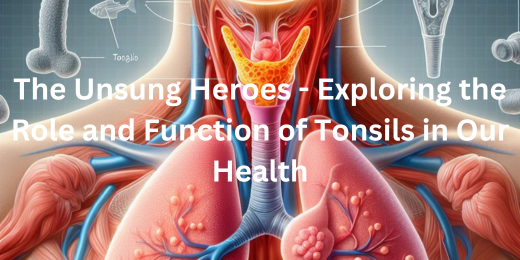Role of tonsils
Tonsils, often overlooked but significant, serve an essential role in our health. These small masses of tissue are located at the back of the throat and form part of the immune system. Acting as a defensive barrier, tonsils intercept pathogens that try to enter the body through the mouth and nose, helping prevent infections from spreading further.
Additionally, they contribute to the immune response by producing antibodies that combat harmful invaders. Understanding the crucial role of tonsils in our immune defense provides valuable insights into their importance in maintaining overall well-being and promoting a healthy body.
Understanding Tonsil Function
The role of tonsils in our immune system is twofold. Firstly, they act as efficient filters, intercepting and trapping pathogens such as bacteria and viruses that enter the body through the mouth and nose. By capturing these harmful invaders, tonsils prevent them from further infiltrating the respiratory and digestive systems, thus serving as a vital line of defense.
Secondly, tonsils play an active role in the production of antibodies. These specialized proteins help the body identify and neutralize specific pathogens, strengthening the immune response against infections. By comprehending the functions of tonsils, we gain valuable insights into their significance in protecting our health and well-being.
Tonsillitis: Common Issues and Concerns
Tonsillitis, the inflammation of the tonsils, is a common condition that can affect individuals of all ages. It can be caused by viral or bacterial infections, leading to symptoms such as sore throat, difficulty swallowing, swollen tonsils, and fever. Recurrent tonsillitis is a concern for some individuals, as it can significantly impact their quality of life and overall health.
Persistent or severe cases of tonsillitis may lead to complications such as abscess formation or obstructive sleep apnea. While most cases of tonsillitis can be managed with rest, fluids, and pain relievers, recurrent or severe cases may require medical intervention, including the possibility of tonsillectomy.
Understanding the causes, symptoms, and potential complications of tonsillitis can aid in early recognition and appropriate management.
Tonsillectomy: When Surgery is Necessary
Tonsillectomy, the surgical removal of the tonsils, becomes necessary under certain circumstances. Indications for this procedure include recurrent and severe tonsillitis, which can significantly affect a person’s health and quality of life. Tonsillectomy may also be recommended when the tonsils are enlarged, causing breathing difficulties or obstructive sleep apnea.
The surgery is typically performed under general anesthesia, and the recovery period varies from person to person, usually requiring a few days of rest and discomfort. Aftercare is crucial to ensure a smooth recovery, and patients are advised to follow post-operative instructions carefully.
While tonsillectomy is generally considered safe and effective, it is essential to discuss the potential benefits and risks with a healthcare professional before making a decision.
The Controversy Surrounding Tonsillectomy
Tonsillectomy, the surgical removal of the tonsils, has been a topic of controversy in the medical community. Similar to any medical procedure, there are advantages and disadvantages that need to be taken into account. On the positive side, tonsillectomy can provide relief for individuals who suffer from chronic and recurrent tonsillitis, leading to improved quality of life and fewer sick days.
It may also help alleviate breathing difficulties and sleep apnea caused by enlarged tonsils. However, it is essential to be mindful of potential drawbacks and negative aspects that might arise from the situation or decision. Tonsils are a part of the immune system, and their removal may impact the body’s ability to fight infections. Additionally, the procedure carries risks associated with surgery, such as bleeding and anesthesia complications.
Medical recommendations consider the role of tonsils, individual’s medical history, symptoms, and overall health for tonsillectomy. Thorough discussions with healthcare providers are essential for patients to weigh benefits and risks before making the decision.
Keeping Tonsils Healthy: Preventive Measures
Understanding the role of Tonsils in our immune system is crucial for adopting preventive measures. Good hygiene practices play a significant role in tonsil health, such as washing hands regularly and avoiding close contact with individuals who have infections. Maintaining oral hygiene through brushing and using mouthwash can reduce the accumulation of bacteria in the mouth and throat.
Additionally, to support the function of Tonsils in fighting infections, it is essential to strengthen the immune system. A balanced diet, rich in vitamins and minerals, regular exercise, and stress management can all contribute to a stronger immune system, enhancing the tonsils’ ability to defend against pathogens.
By following these preventive measures, we can maintain the health and function of our tonsils and promote overall well-being.


